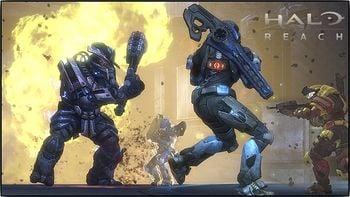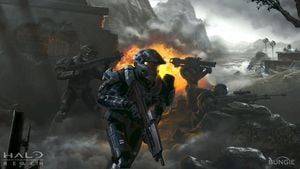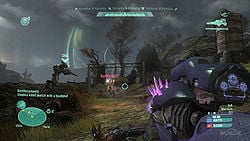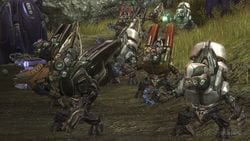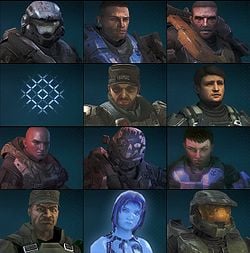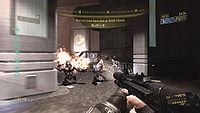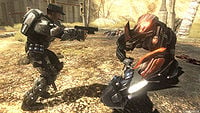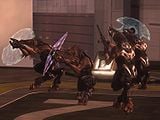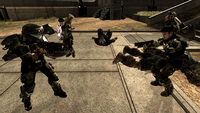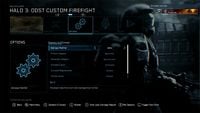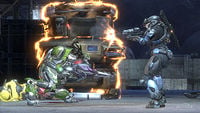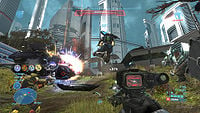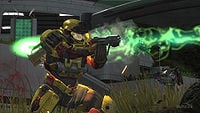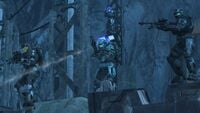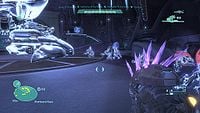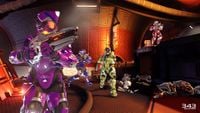Firefight
From Halopedia, the Halo wiki
- "This is Firefight. And we need every able body we can get. Even yours."
- — Sergeant Major Avery Junior Johnson[1] (Halo 3: ODST)
Firefight is a single or cooperative wave defense mode in Halo 3: ODST and Halo: Reach, where up to four players can co-operate with one another via system link or Xbox LIVE and fight against waves of Covenant attackers. This mode allows them to battle in multiple environments based on campaign maps, on foot or in vehicles, against increasingly difficult waves of Covenant attackers.[2] Halo: Reach's firefight has a large number of customization options and new features, including Matchmaking support,[3] as well as many new game modes such as Generator Defense and Versus.
Firefight was reimagined for Halo 5: Guardians as Warzone Firefight, a sub-game mode of Warzone.[4] Halo Wars 2 features both Blitz Firefight and Terminus Firefight, similar in concept to ODST and Reach's wave defense modes. The former runs on a faster pace through the use of Blitz cards, and the latter is an elaboration on Reach's generator defense concept, pitting players against infinite waves of enemies, while defending a Forerunner artifact through the game's base building mechanics.
Gameplay
- "Problem is, we got alien bastards in the house. Each new wave means more bad guys. Five waves make up a round. Three rounds in a set. Sounds easy, huh? Wrong! See these skulls? When they activate, they turn a casual Covenant make-out session into a full-on test of your manly prowess!"
- — Sgt. Johnson[1]
Halo 3: ODST
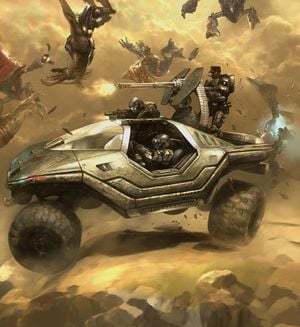
- Main article: Firefight (Halo 3: ODST)
- "Built on top of Halo 3: ODST's campaign, Firefight is a cooperative game mode that lets you and up to three of your friends put your skills to the ultimate test. It allows you to jump straight into the heart of Halo and experience traditional Halo sandbox encounters with a new, high octane twist. Though you’ve squared off against most of the enemies you’ll face in Firefight before, you’re not going to be able to rely on your past experiences alone to guide you through all of the action. In Firefight, even the most "harmless" enemy can become a dangerous threat when you’re low on ammo, low on lives, and have your back against the wall. Throw game play modifying skulls into the mix and you'll find that the combat can become even more interesting and intense."
- — Bungie.net description
Firefight has no limit to the waves of enemies, and continues until the squad has completely run out of lives. There are five Waves in a Round and three Rounds in a Set. The Set, Round, and Wave can be seen at the top left side of the player's screen. The Set number is represented by a number from one to infinity; the Round is represented by a circle, going from left to right; the Wave is represented by five slanted vertical boxes, going from left to right.
In the beginning of Firefight, the squad will share seven lives between all of the players.
At the end of a round, there will be a brief pause where the players will be allowed to collect ammo and regroup with their squad mates. Their scores are shown in the top right of the screen, with the team score being on the top.
To increase difficulty throughout the game and increase the multiplier for kills, skulls are activated between rounds and sets. Three skulls are assigned to rounds (Tough Luck, Catch and Black Eye), three skulls are assigned to sets (Tilt, Famine and Mythic), and one skull assigned to the Bonus Round (Iron). Regardless of the difficulty, the Tough Luck skull will be enabled from the start. With each new round and set, more skulls become enabled, more than one at a time. If one person can stay alive, they will be awarded with higher scores and medals. Though each enemy class is worth a base number of points, earning medals can modify the player's tally as they go.[5]
Additionally, once a team has survived a Set, they will go on to the Bonus Round. Because it is only a Bonus Round, any deaths will not be subtracted from the overall life pool, and as the Iron Skull is activated at the start, the player cannot respawn until time runs out. The Bonus Round provides players a chance to earn extra lives before the next Set. Extra lives will be unlocked every 2,000 points scored after the beginning of the round. The Bonus Round consists entirely of Grunts while all the skulls are turned on.[6]
If one scores a total of 200,000 points on any map in Firefight, they will unlock an achievement which is available for every map (except for the "night" missions, which will unlock an achievement for their daytime counterparts), making Firefight have a total of eight achievements worthy of 10 gamerpoints each.
Halo: Reach
- "It’s official. Firefight is back and better than ever. To get your drool on, go ahead and salivate over a Firefight that’s fully integrated into Halo: Reach’s matchmaking and topped off with an insane side of complete player customization, right down to each Set, Round, and Wave. And that’s just the beginning of the control you have over the experience."
- — Bungie.net description[7]
The game mechanics featured in Halo 3: ODST return for the Firefight mode featured in Halo: Reach. Referred to as "Firefight 2.0".,[Note 1] the mode features eight maps on the disc: Waterfront, Beachhead, Overlook, Courtyard, Corvette, Outpost, Glacier and Holdout (all of which are also featured in campaign). Additionally, a new map, Unearthed, was released with the Defiant Map Pack on March 15, 2011 and another one, Installation 04, was released with the Anniversary Map Pack on November 15, 2011.
In addition, Firefight now consists of a multitude of gametypes. "Classic Mode," as the name suggests, has the same rules as ODST's version of Firefight, while Default mode ends after a single set is completed, or the players run out of lives. Generator Defense also makes a return as a Firefight gametype. Given Firefight's new matchmaking support, there are also Firefight-specific commendations and Challenges, updated on a daily or weekly basis, that will earn the player bonus credits upon their completion. Customization options have been greatly expanded, including options to alter weapons, maps, game duration, and enemy behavior.[8] The player is also able to create up to three customized skulls of their own for use in Firefight.[3] The appearance of your custom Noble Six character from Campaign will carry over to Firefight, with a selection of voices from other characters to choose from (including characters from past games, such as the Master Chief, Cortana, and Sergeant Johnson).
At the 2010 San Diego Comic-Con, Bungie revealed a new Firefight gametype called Firefight Versus.[9] This new 2v2 matchmaking gametype features a team-slayer style function focusing on UNSC versus Covenant warfare. It is unique in that it is the first gametype to ever feature AI Covenant allies. Players will either be Spartans or Elites, and those that are chosen to be Elites are aided by other Covenant troops such Grunts, Jackals or Brutes. The objective of this gametype is to simply slay the opposing force and to rack up as many points as possible. Spartans will score points by either killing Elites (the opposing players) or the other Covenant forces (AI-controlled enemies). Additionally Spartans will have a limited pool of lives (similar to ODST's Firefight mode) that will deplete as a teammate or a player is killed. However, Spartans will gain an additional life and a large amount of points for each Elite they kill (only the player-controlled Elites will net an extra life, not other AI-controlled Covenant forces) making the Elites a strategic target amongst the battalions of Covenant forces. Elites have infinite lives in this gametype and will receive no points for kills, however their statistics will be shown in a full post-game carnage report, as will the Spartans. Special medals will be earned by both Elites and Spartans in this gametype, as well. Time is another factor that can determine the outcome of this gametype, as rounds are broken up into a specific amount of time to either defeat the opponent by killing them, or by scoring more points than the other players as Spartans, seeing as only Spartans can score points. Every player will have the chance to be both Spartans and Elites, and after each round, players switch roles to ensure a fair balance of play. Basically, the team who has the most points at the end of the rounds wins the match.
Other gametypes were revealed by Bungie, such as the Gruntpocalypse Firefight gametype.[10] This gametype is quite similar to the Bonus Rounds in Halo 3: ODST where Grunts pour in the map in a seemingly endless flood, throwing lethal grenades all over the place and ensuring that chaos ensues.
Score Attack is another Firefight gametype revealed by Bungie. In Score Attack, players are not be able to customize the gametype at all, and all waves will be standardized. Every game will essentially be the same (except the players' reactions); this allows Bungie to create Leaderboards with this gametype that pertain to skill and other factors, and can be fully tracked in-game and on Bungie.net along with other Halo: Reach stats.[10]
It should further be noted that all Firefight gametypes listed here can be customized fully in Custom Games.
As of the October 2010 Update part 2, Firefight matchmaking games will no longer be one round, and will be one set. As of the same update, in the Score Attack matchmaking, Crashsite will no longer be available, and replaced with Mythic Score Attack, which is the same as Score Attack, except with the Mythic Skull on. Also with this update, Glacier is included in Firefight matchmaking and Score Attack.
Characters
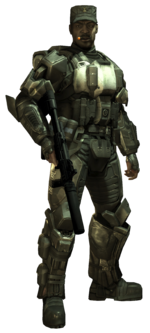
The playable characters in Firefight in Halo 3: ODST are acquired by different means, most of them unlocked by earning achievements. Players are allowed to customize their emblem, background, color (which now includes formerly unavailable ones: black, olive, etc.) and Service Tags (which now allow any combination of up to four characters), much like in Halo 3 multiplayer. The player's helmets are removable (with the exception of the Rookie, who never has his face revealed, and Johnson, who does not have one), but it has no effect on game play in any way, as the player's VISR is still available.
In Halo: Reach, instead of playing as the characters themselves, the player will retain their variation of SPARTAN-B312, but have a choice of a "Firefight voice". The Firefight voice selected will be the player's voice in gameplay.[11]
Halo 3: ODST
- Rookie: Unlocked by default.
- Veronica Dare: Complete the campaign on Legendary.
- Edward Buck: Unlock the Tayari Plaza achievement.
- Dutch: Unlock the Uplift Reserve achievement.
- Romeo: Unlock the NMPD HQ achievement.
- Mickey: Unlock the Kizingo Boulevard achievement.
- Avery Junior Johnson: Unlocked by pre-ordering the game.
Halo: Reach
The voices listed below are seen as available items in the Armory from the start, Noble Six being the only default.[12]
- Noble Six:[11] Unlocked by default.
- Carter-A259:[11] Purchasable at default for 100,000 credits.
- Kat-B320:[11] Purchasable at default for 10,000 credits.
- Jun-A266:[11] Purchasable at default for 10,000 credits.
- Emile-A239:[11] Purchasable at default for 10,000 credits.
- Jorge-052:[11] Purchasable at default for 10,000 credits.
- John-117: Purchasable at default for 150,000 credits.[11][13]
- Cortana: Purchasable at default for 100,000 credits.[11][13]
- Sgt. Johnson: Purchasable at default for 100,000 credits.[11][13]
- Edward Buck: Purchasable at default for 15,000[11][13]
- Sgt. Stacker: Purchasable at default for 5,000 credits.[11][13]
- Auntie Dot: Purchasable at default for 15,000 credits.[11][13]
Maps
Halo 3: ODST
Firefight in Halo 3: ODST has eight maps[1] to choose from (some are acquired by unlocking achievements). The maps are as follows:
- Alpha Site: Unlock the ONI Alpha Site achievement.
- Chasm Ten: Unlock the Data Hive achievement.
- Last Exit: Unlock the Coastal Highway achievement.
- Lost Platoon: Unlock the Uplift Reserve achievement.
- Crater: Unlocked by default.
- Rally Point: Unlocked by default.
- Security Zone: Unlocked by default.
- Windward: Unlocked by default.
Halo: Reach
- Beachhead
- Corvette
- Courtyard
- Installation 04 (Anniversary Map Pack)
- Glacier
- Holdout
- Outpost
- Overlook
- Waterfront
- Unearthed (Defiant Map Pack)
Trivia
- Firefight is similar to wave defense game modes found in many other games, examples including the survival mode from the Xbox LIVE Arcade port of Marathon 2, Nazi Zombies from Call of Duty: World at War, Invasion from Unreal Tournament 200X, Survival Mode from Left 4 Dead, and Horde from Gears of War 2. In all of these game modes, players attempt to survive against countless numbers of enemies of increasing difficulty over a long period of time.
- In Halo 3: ODST and Halo: Reach, the Firefight maps of each title on launch used exact geometry from the campaign. This only deviated with Unearthed, released in the Defiant Map Pack, and later Installation 04, released with the Anniversary Map Pack.
- In the original Xbox 360 version Halo 3: ODST, no map in Firefight featured the Assault Rifle or Flamethrower. These weapons appear in ODST's campaign but were excluded from Firefight. The Assault Rifle was later able to be used in Halo: The Master Chief Collection's version of Firefight through spawn options.
- Firefight was originally going to be included in Halo 3, but due to time constraints, it was not included.[14]
- In Halo: Reach, all Firefight matchmaking matches are by default set on Heroic difficulty.
- In Halo: Reach, players can activate their night vision just like in campaign. SPARTAN players have their usual green night vision, while Elite players have purple night vision.
- In Halo: Reach's Firefight, AI can headshot the player. This is not possible in the campaign.
- The Firefight map Installation 04 is the first map to include friendly AI.
- Despite the new title update that coincided with the release of Halo: Combat Evolved Anniversary, there are no additional settings added to the Firefight options in regards to the addition of friendly human AI.
- The Sangheili Zealot and Sangheili Field Marshal are not included in Firefight.
- Unlike Halo 3: ODST, Halo: Reach does not include Drones or consistent Engineers in Firefight excluding the map Corvette.
- If any of the skulls or any traits to are customized to the players' advantage, the game will only count points for time played and not enemies killed. Each player will receive 60 points per hour played, or 1 point every minute.
Gallery
Johnson fighting a Jiralhanae Chieftain on Lost Platoon.
A Jackal lance on Windward.
4 players on Security Zone.
A Firefight Generator Defense match on Waterfront in Halo: Reach.
A Firefight match on Beachhead.
A Spartan-III fighting a Mgalekgolo.
4 players during a game of Sniperfight on Glacier.
Elite night vision is only available in Firefight.
Notes
- ^ In sources regarding Firefight in Halo: Reach, Bungie employees refer to Firefight as "Firefight 2.0".
Sources
- ^ a b c Halo 3: ODST ViDoc: Bip. Bap. Bam.
- ^ Bungie.net: Halo 3: ODST Project Page
- ^ a b IGN: E3 2010: Firefight in Halo: Reach – Bigger & Better
- ^ YouTube: Halo 5 Guardians: Hammer Storm Launch Trailer
- ^ Bungie.net: Drop Into Firefight
- ^ Bungie.net: Bungie Weekly Update: 08/14/09
- ^ Bungie.net: Welcome to Firefight 2.0
- ^ Bungie.net: Bungie Weekly Update 06/18/10
- ^ IGN: SDCC 10: Halo: Reach Adds Versus Firefight
- ^ a b IGN: IGN Video Preview
- ^ a b c d e f g h i j k l m Bungie.net: Initial Armory Inventory
- ^ Bungie.net: Bungie Weekly Update: 07.16.10
- ^ a b c d e f IGN: Why is Master Chief in Halo: Reach?
- ^ Co-Optimus: A Look Back: Halo 3: ODST Designed For Co-op
| |||||||||||
